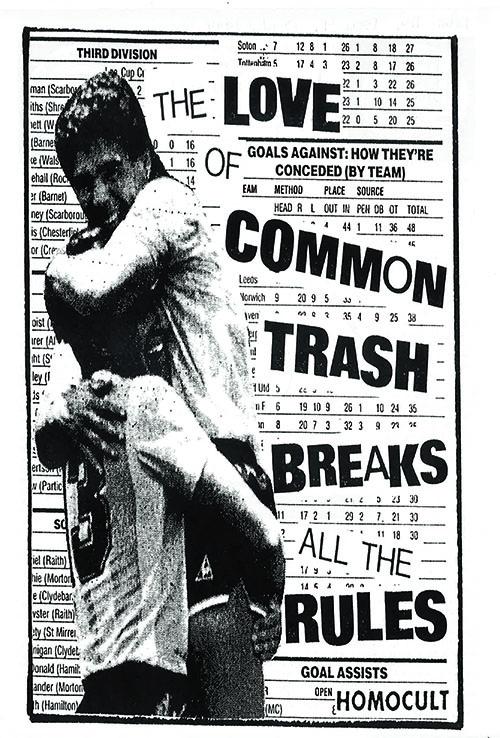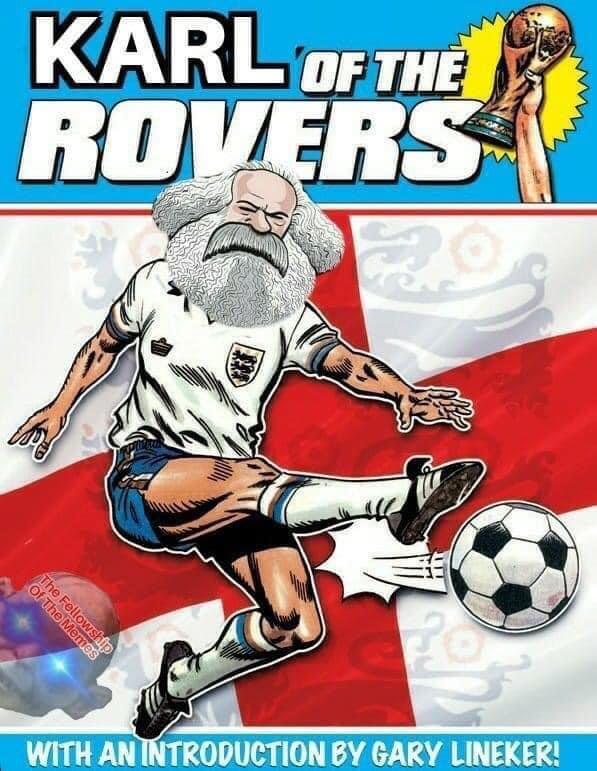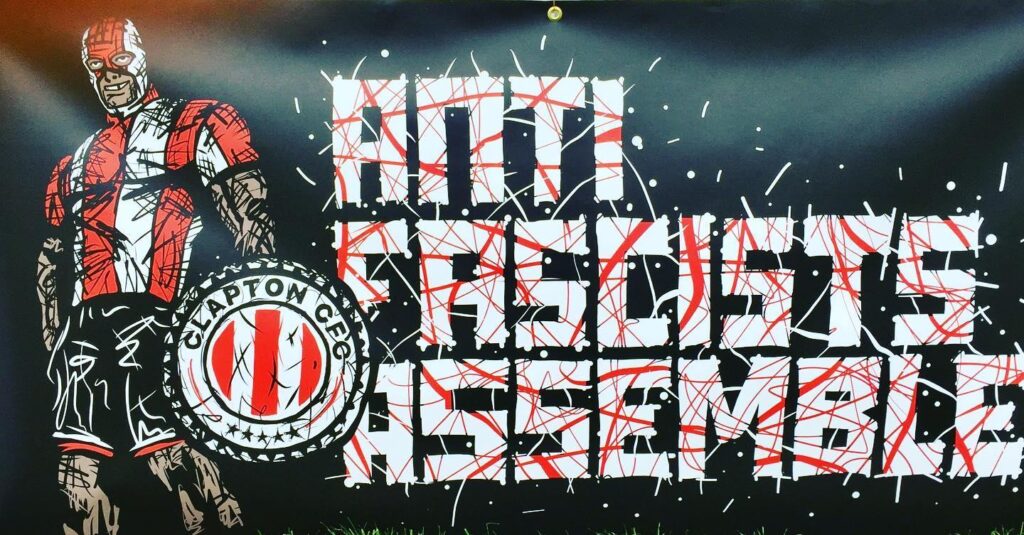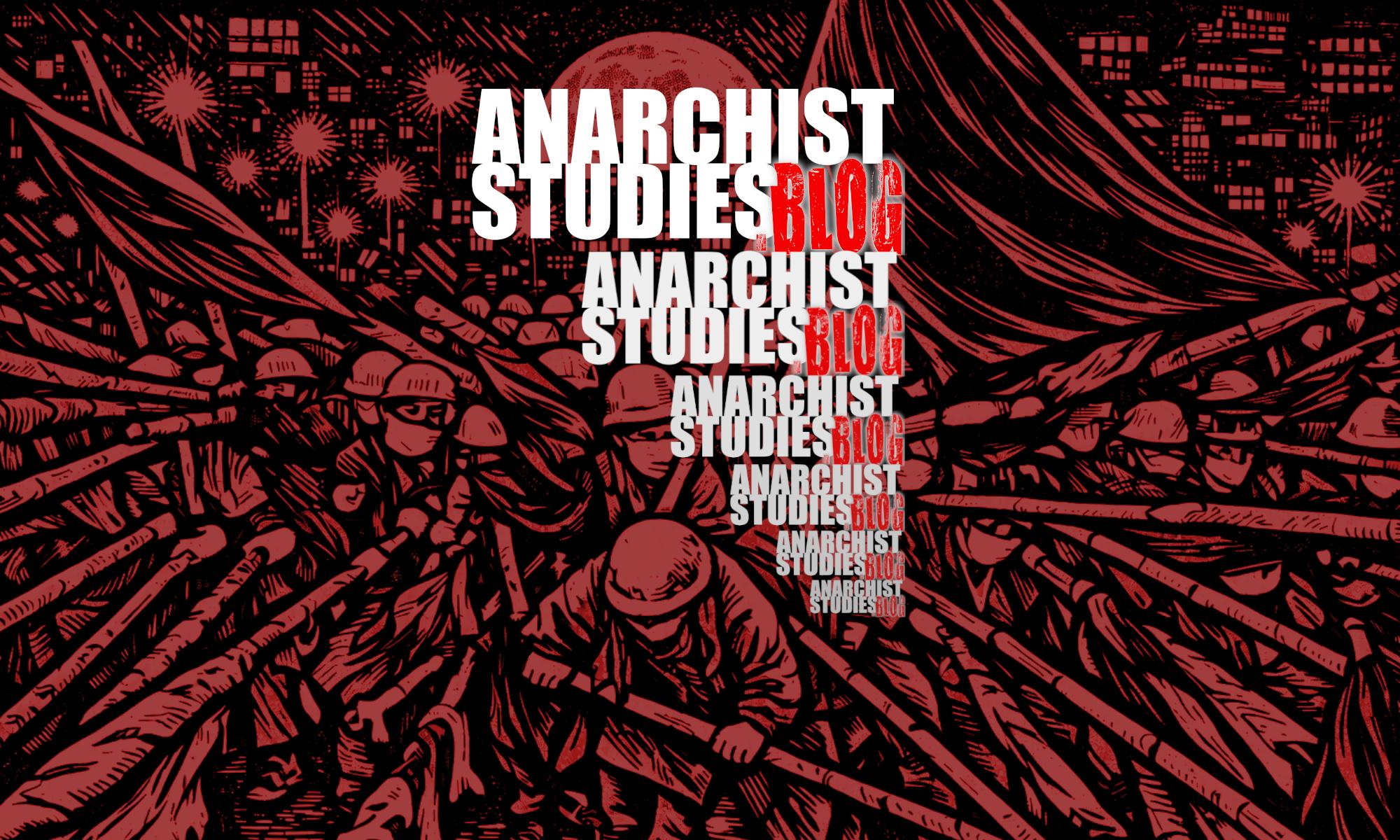by Stevphen Shukaitis
19th June 2025
What might a Scottish football coach contribute to anarchist political theory?
At first glance, the question may seem eccentric. Anarchism – and leftist politics more broadly – has often neglected sport, dismissing it as a distraction for the masses, a kind of modern-day “opium” that numbs rather than activates. But this view overlooks the reality that millions of people engage with football passionately, not passively. As such, it represents a terrain of emotional, social, and cultural intensity – a site where collective identifications, relationships, and values are forged and contested. It is precisely because of this reach and resonance that football demands closer political attention. This essay takes up that call, arguing that anarchist thought can learn from debates in football tactics. Gabriel Kuhn’s excellent book Soccer Vs. The State: Tackling Football and Radical Politics is an important starting point, documenting how football can animate solidarities and subcultures beyond the stadium. But the argument here is more specific: I draw from five years of writing by Jamie Hamilton, a coach at Ayr United in Scotland whose wide-ranging tactical and philosophical reflections challenge dominant models of thinking about football.

Hamilton’s critique of football mirrors the political critique made by thinkers like James C. Scott. Like Scott’s rejection of state-led rationalist schemes in Seeing Like a State, Hamilton opposes the imposition of rigid, top-down structures in football – what he calls the rise of “Positionism.” This is football as technocratic order, as systematized control, as a space where logic, data, and algorithm reign. The introduction of VAR, with its obsession over reducing errors and increasing accuracy, is just one symptom of what Hamilton calls bureaucraphilia: an abnormal fondness for, or infatuation with bureaucratic mechanisms of authority. Against this, he advocates for an alternative rooted in emergence, intuition, relation, and play – what he terms “Relationism.” Football, for Hamilton, is not a machine to be optimized but a form of living culture. It is drama, not code; improvisation, not automation. And just as anarchist politics resists the abstractions and control logics of the state, Hamilton’s football resists those of the analyst’s spreadsheet. By reading Hamilton alongside anarchist theory, this essay explores how football might help reimagine politics – not as the management of fixed structures, but as the unfolding of situated, embodied, and collective creativity.

One of Jamie Hamilton’s central objections is to what he terms Positionism, the currently dominant paradigm in elite football tactics. Positionism is the tactical logic underlying what is often celebrated as the most advanced and effective form of the modern game – exemplified by teams managed by figures like Arrigo Sacchi and Pep Guardiola. This approach treats the football pitch as a fixed and abstract grid, a rationalized space to be efficiently occupied and controlled. Players are trained to operate within predefined zones, their movements choreographed according to pre-planned automations and decision trees. Tactical efficiency, spatial occupation, and positional discipline become the hallmarks of success. From this perspective, football becomes a problem to be solved: a game of maximizing probabilities through systemic coordination. But Hamilton critiques Positionism not merely on tactical grounds, but on philosophical and political ones. He sees it as an extension of a broader rationalist worldview – one that seeks to impose order, predictability, and control over a dynamic and unpredictable human activity. Positionism is not just a footballing method; it is a manifestation of what James C. Scott would call a high modernist logic – a belief that human activity can and should be rendered legible, codified, and governed from above. In this sense, Positionism becomes football’s version of state planning: it denies the messy, situated knowledge of players on the ground in favour of an abstract schema imposed from the touchline or the analyst’s screen.
In contrast, Hamilton advances a counter-model he calls Relationism. Where Positionism sees space as static and objective, Relationism understands it as emergent, relational, and felt. Meaning in football arises not from occupying the right zone on a tactics board, but from the live, improvisational interactions between players as they move, communicate, and respond to unfolding events. Rather than viewing players as interchangeable components executing a system, Relationism treats them as co-creators of the game’s unfolding shape – much like musicians in a jazz ensemble or dancers in a tightly woven choreography. Tactical coherence emerges through proximity, rhythm, and responsiveness, not from universal prescriptions. Hamilton draws from a wide set of influences to develop this relational vision – including the philosophy of Gilles Deleuze and Felix Guattari, the unpredictability of quantum mechanics, and the materialist dialectics of Marxist thought. All of these intellectual traditions share a suspicion of rigid systems and a focus on the unpredictable emergence of new forms through interaction, flux, and contradiction. Football, in this view, is not a closed system governed by static laws but a living practice – shaped as much by intuition and affect as by logic.

This is where Hamilton’s critique becomes explicitly political. He aligns Positionism with a kind of colonial rationality – an ideology that seeks to impose control over space, over movement, over bodies. By contrast, Relationism resonates with indigenous, subaltern, and anti-colonial ways of knowing: ways that privilege relationship, local knowledge, lived context, and emergent order. Just as colonial powers dismissed indigenous ways of life as irrational or backward in order to justify their domination, Positionism dismisses improvisational footballing traditions – particularly those emerging from the Global South – as chaotic or naïve. Yet it is often within these supposedly unstructured styles that we find some of football’s richest creative expressions. Hamilton’s writing thus reframes a tactical debate as a cultural and political struggle: a struggle between technocratic control and embodied freedom, between abstraction and life, between a football built in the image of the machine and a football that pulses with the rhythms of the street and the people. In this light, Relationism is not only a philosophy of football, but a gesture of resistance – a refusal to let the game be fully colonized by the metrics, models, and mechanisms of managerial rationality.
For Jamie Hamilton, true footballing identity does not emerge from the whiteboards of analysts or the digital dashboards of performance data – it emerges from the potrero. A term rooted in Latin American football culture, the potrero refers to the open, often improvised spaces where people gather to play the game: patches of land that may be muddy, concrete, dusty, or uneven, but which serve as the crucibles of football’s deepest creativity. These are not training grounds; they are sites of expression. In places like La Castellane, where Zinedine Zidane first learned to play, or in the tightly fenced cages of inner-city London, players develop their style, technique, and instincts in dialogue with the material conditions of their environment. No two potreros are the same, and that difference is generative. It gives rise to local idioms, styles, and sensibilities – what Hamilton sees as authentic footballing cultures. Yet these forms of football, grounded in locality and improvisation, have long been under threat. The dominant tactical ideologies exported from Europe – particularly the Dutch-derived Total Football and its contemporary successor, Positionism – often work to suppress these vernacular styles. Whether it’s Argentina’s La Nuestra or Brazil’s Jogo Funcional, such traditions are routinely marginalized in the global hierarchy of tactical “sophistication.” Their relational, improvisational, and aesthetic qualities are often dismissed as disorganized or outdated in contrast to the supposed modernity and rationality of Positionist systems. In this dynamic, Hamilton sees a form of cultural colonization: the imposition of a universal model of play that flattens difference, stifles invention, and disciplines the unpredictable.
In contrast, Hamilton praises a growing group of coaches – Marcelo Bielsa, Roberto De Zerbi, Francesco Farioli, Fernando Diniz, and Henrik Rydström – who push back against this colonizing tendency. Rather than treating football as a system to be engineered from above, these coaches view it as a relational art form that must remain connected to the contexts and cultures from which it emerges. Their teams often exhibit tactical fluidity, emotional intensity, and an openness to improvisation – qualities that resist the algorithmic tendencies of the modern game. They do not merely accept difference; they cultivate it. In doing so, they revive the spirit of the potrero and reassert the importance of place, people, and perception in football’s development.
Hamilton’s broader critique of contemporary football goes beyond tactics; it is a critique of modernity itself. The rationalizing tendencies that shape coaching and tactical theory are, in his view, inseparable from the logics of the modern state, capitalism, and technocratic control. Just as bureaucratic institutions impose abstract forms of order onto living societies, football is increasingly dominated by what he calls bureaucraphilia – an obsessive faith in protocols, measurements, and mechanisms of oversight. Coaching has become commodified; ideas are turned into marketable content, and tactical discourse is flooded with pseudo-scientific jargon designed more to signal expertise than to enhance play. Access to knowledge is gatekept, and the actual experiences of playing and feeling football are subordinated to the abstractions of data and diagrams. In this context, Hamilton’s writing becomes more than a series of tactical reflections – it is a political intervention. He challenges us to ask not only how football should be played, but what kind of football world we are building. Do we want a game dictated by metrics, hierarchies, and universal models? Or one rooted in locality, difference, and relational creativity? By insisting on the value of the potrero and the irreducible complexity of football as lived experience, Hamilton positions himself as a kind of footballing anarchist: resisting the top-down, rationalized domination of the sport and calling for a return to its grassroots, plural, and expressive roots.
But Hamilton’s project is not merely critical; it is also constructive. While he rigorously critiques the rationalizing logics of modern football – its obsession with control, data, and structure – he simultaneously offers alternative frameworks for thinking about the game. These alternatives are not just tactical innovations but conceptual shifts. Through a kaleidoscope of metaphor and reference, Hamilton reimagines football not as a mechanical problem to be solved, but as an expressive, living, and deeply human practice. One of his key strategies is to draw upon metaphors from music, theatre, religion, and cybernetics – domains where meaning is often emergent, affective, and relational rather than strictly logical. These metaphors help shift the framing of football from a closed system of tactical computation to an open field of aesthetic and social engagement. For example, Hamilton explores Jurgen Klopp’s now-famous phrase “heavy metal football,” not just as a catchy branding exercise, but as a meaningful way of conceptualizing tempo, intensity, and affect in football. The term evokes sound, atmosphere, chaos, and raw energy – all qualities that resist codification.
Similarly, he refers to Roberto De Zerbi’s coaching as “Brechtian” – invoking the German theatre director Bertolt Brecht, whose work challenged audiences to see the world not as it is, but as it might be changed. De Zerbi’s tactics, for Hamilton, operate like a kind of estrangement effect: they de-familiarize the game, compelling spectators to reflect critically on its form and meaning. Moments like De Zerbi’s players standing still with the ball in their own penalty box, luring opponents into overcommitting before slicing through them with short, sharp passes, are theatrical provocations – deliberate breaks from convention designed to unsettle and reframe. These metaphors are not decorative; they are epistemological. They offer ways of knowing football that are radically different from those championed by the dominant, data-driven schools. Where Positionist football appeals to fixed structures and quantifiable efficiencies, Hamilton’s approach insists that the game can only be truly understood through attention to its material, embodied, and contextual realities. Football, he argues, is shaped not by abstract tactical theories or the intellectual authority of “Great Men,” but by the messy, dynamic relationships between people and place.
In this way, Hamilton’s perspective is deeply materialist – though not in a crude, economistic sense. Rather, he invites us to consider how geography, class, culture, infrastructure, and local history shape the way football is played, watched, and understood. A team’s style is not just a function of its manager’s philosophy but of its stadium, its supporters, its training pitches, its urban context, its weather, its economic conditions. Hamilton’s emphasis on place reorients football theory away from the universalizing tendencies of elite tactical discourse and towards a situated, grounded way of seeing – one that refuses to sever the game from the world in which it is embedded. In doing so, Hamilton opens the door to a richer, more pluralistic football culture – one that celebrates multiplicity over uniformity, creativity over compliance, relation over rationalization. Football, in his vision, is not merely a tactical game but a cultural language – a way of expressing, resisting, and imagining life itself. Hamilton’s body of work reads less like conventional sports commentary and more like a manifesto – a passionate call to reclaim the soul of football from the forces of rationalization, abstraction, and commodification. For Hamilton, the modern game has not merely evolved; it has been colonized. Its expressive, spontaneous, and communal nature has been subordinated to a technocratic regime of metrics, control systems, and market logic. In response, he calls for a profound shift: from static, top-down models of tactical authority to dynamic, bottom-up patterns of emergence. From Positionism, with its rigid geometries and quantifiable structures, to Relationism, where meaning arises through interaction, proximity, and collective intuition. From abstraction to embodiment, from the machine to the human.

This framework does not merely describe a tactical choice; it articulates a deeper political and philosophical vision – one that resonates strongly with contemporary currents in anarchist thought. Much like Hamilton’s football, anarchist politics has long sought to challenge imposed hierarchies and centralised authority in favour of decentralised, relational, and situated forms of organisation. Just as Positionism imposes a tactical schema from above, traditional political strategy has often begun with universalist blueprints, treating political subjects as interchangeable units to be arranged according to a rational plan. But Hamilton, echoing a more anarchist sensibility, suggests an alternative: to begin not with abstract principles or fixed models, but with the specific, the contingent, the local. Just as football’s meaning is forged in the mud of the potrero, so too should political strategy emerge from lived conditions, embodied experiences, and relational dynamics. The pitch becomes a metaphor for the world – a space where people must constantly adapt, communicate, and create in real time, drawing on intuitive understandings rather than prescribed instructions.
This relational view of tactics and strategy mirrors the insights of thinkers like James C. Scott, whose critique of high-modernist state planning exposes the dangers of privileging abstract order over local knowledge. In football, as in politics, attempts to control every variable from above lead not to flourishing but to stagnation. What Hamilton proposes is a turn toward improvisation, experimentation, and trust in the emergent intelligence of people working together in real situations. Thus, his call to move from Positionism to Relationism is more than a critique of coaching paradigms; it is a proposal for a broader way of thinking about life, power, and collective action. It challenges us to rethink how we organise, how we learn, how we relate – not just on the pitch, but in the world. In this sense, Hamilton’s football writing becomes a potent resource for anarchist politics: not as a footnote or a curiosity, but as a living, breathing model of how freedom might be practiced, rehearsed, and embodied through play.
Further Reading
This article is based on an extended reading of Jamie Hamilton’s writings on Medium, which can be located here: https://medium.com/@stirlingj1982. While all of Jamie’s writing is interesting, I would suggest the following pieces as being the most insightful:
‘Fernando Diniz vs the Man Machine’
https://medium.com/@stirlingj1982/fernando-diniz-vs-the-man-machine-134bde05d0d0
‘What is Relationism?’
https://medium.com/@stirlingj1982/what-is-relationism-c98d6233d9c2
‘Project Cyberball. How Marcelo Bielsa is freeing Science from the clutches of Capital’
https://medium.com/@stirlingj1982/project-cyberball-77e744ab59cd
‘Dangerous Provocations. Roberto De Zerbi: The Brechtian Coach Who Is Reframing Our Relationship with Football’
https://medium.com/@stirlingj1982/dangerous-provocations-79acd3a890f
‘VAR & The Encroachment of Pure Rationalism’
https://medium.com/@stirlingj1982/var-and-the-encroachment-of-pure-rationalism-f57cb9540fb7
References
Gabriel Kuhn (2019) Soccer Vs. The State: Tackling Football and Radical Politics. PM Press.
James C. Scott (1994) Seeing Like a State: How Certain Schemes to Improve the Human Condition Have Failed. Yale University Press
Bio: Stevphen Shukaitis is an academic worker. He likes to do things with his friends, some of which end up making books (https://www.minorcompositions.info). He is a fan of Clapton CFC and Liverpool FC, as well as being a passionate ultra for his son Gustav’s team, Wormingford Wanderers. He enjoys playing football, though honestly, he’s shite at it.
